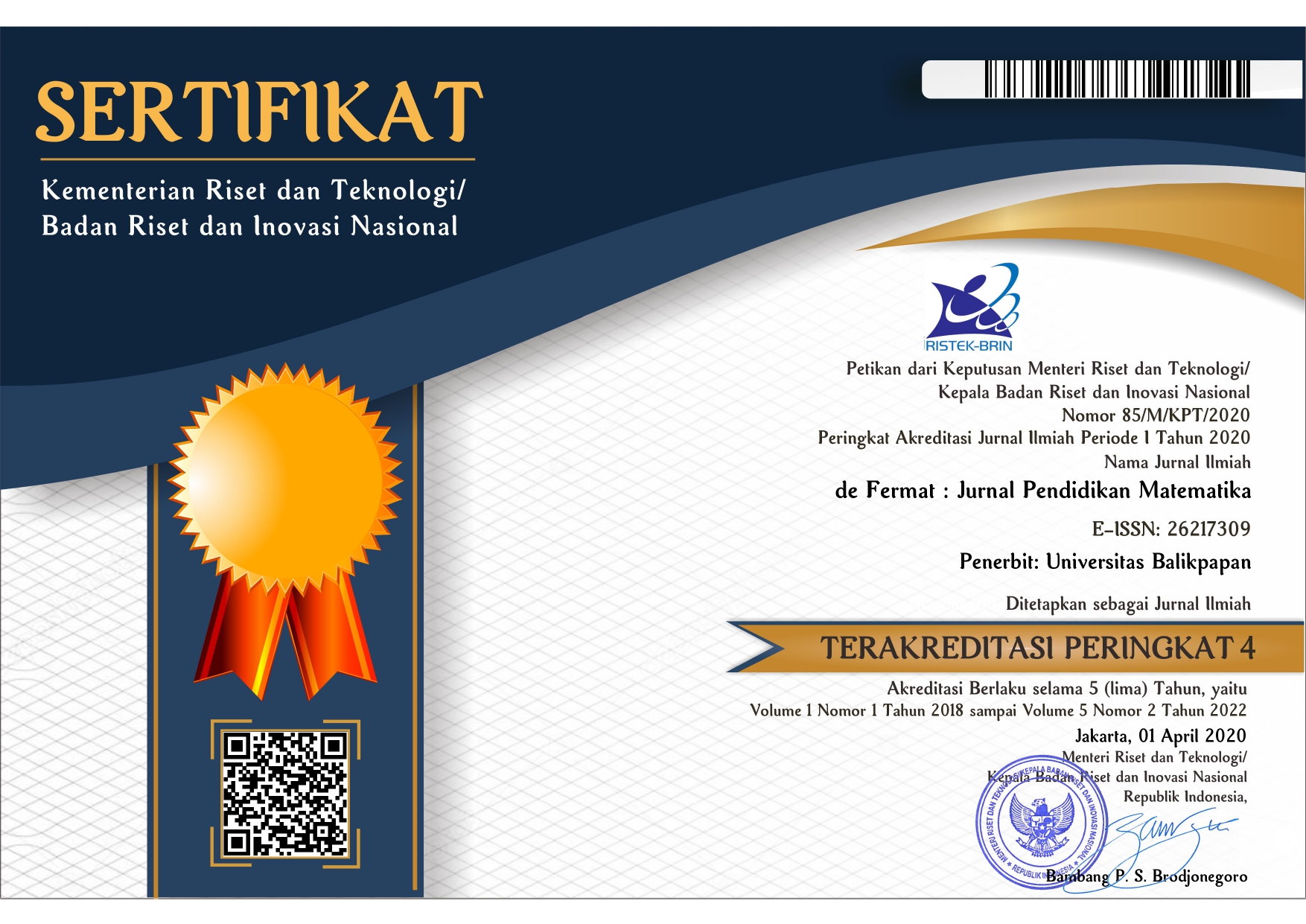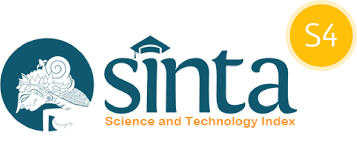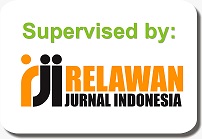LEARNING ACHIEVEMENT OF MATHEMATICS STUDENTS IN DISTANCE LEARNING IN TERMS OF LEARNING MOTIVATION
DOI:
https://doi.org/10.36277/defermat.v5i2.238Keywords:
Learning Motivation, Learning Achievement, Distance LearningAbstract
Motivation for learning is one of the things that need to be raised in school learning efforts. This study aims to detail students' mathematics learning motivation in distance learning. This research uses quantitative research, while this type uses survey methods. The subject of the study was a private high school student in Lamongan, East Java. The instrument used in the study was a survey using a questionnaire made in google form. The student learning motivation survey results, including the criteria of each excellent indicator, found the highest score, namely 90.44%, on the enthusiastic indicator. In comparison, the good indicator found the lowest score of 71.61%.
References
Andriani, R & Rasto. (2019). Motivasi belajar sebagai determinan hasil belajar. Jurnal Pendidikan Manajemen Perkantoran Vol. 4 No. 1. doi 10.17509/jpm.v4i1.14958.
Brophy, J. (2010). Motivating Students to Lear (3th Ed). Routledge: Abidngdon-onThames.
Cleopatra, M. (2015). Pengaruh Gaya Hidup dan Motivasi Belajar Terhadap Prestasi Belajar Matematika. Jurnal Formatif 5(2): 168-181.
Dhull, I., & Parker, J. (2017). Online Learning. International Education & Research Journal (IERJ), 32-34.
Hamdu, G., & Agustina, L., (2011). Pengaruh Motivasi Belajar Siswa Terhadap Pestasi Belajar IPA di Sekolah Dasar. Jurnal Penelitian Pendidikan, 12(1).
Hamzah, B. U. (2009). Teori Motivasi dan Pengukurannya Analisi di Bidang Pendidikan. Jakarta: Bumi Aksara.
Karwati, E. (2014). Pengaruh Pembelajaran elektronik (e-learning) terhadap mutu belajar mahasiswa. Jurnal Penelitian Komunikasi, 41-54.
Lee, J., & Martin, L. (2017). Investigating Students' Perceptions of Motivating Factors of Online Classrom Discussions. International Review of Research in Open and Distance Learning, 148-172.
Lepper, M. R., Corpus, J. H., & Iyengar, S. S. (2005). Intrinsic and Extrinsic Motivational Orientations in the Classroom: Age Differences and Academic Correlates. Journal of Educational Psychology, 148-172.
Palupi, R. (2014). Hubungan Antara Motivasi Belajar Dan Persepsi Siswa Terhadap Kinerja Guru Dalam Mengelola Kegiatan Belajar Dengan Hasil Belajar IPA Siswa Kelas VIII Di SMPN N 1 Pacitan. Jurnal Teknologi Pendidikan dan Pembelajaran, 2(2).
Puspitasari, D. B. (2013). Hubungan antara Persepsi terhadap Iklim Kelas dengan Motivasi Belajar Siswa SMP Negeri 1 Bancak. EMPATHY Jurnal Fakultas Psikologi, 1(1).
Mustofa, M. I., Chodzirin, M., Sayekti, L., & Fauzan, R. (2019). Formulas Model Perkuliahan Daring sebagai Upaya Menekan Disparitas Kualitas Perguruan Tinggi. Walisongo Journal of Information Technology, 151.
Riconscente, M. M. (2014). Effects of perceived teacher practices on Latino high school students’ interest, self-efficacy, and achievement in mathematics. The Journal of Experimental Education, 82(1), 51-73.
Samir Abou El Seoud, M., Taj-Eddin, I. F., Seddiek, N., El-Khouly, M. M., & Nosseir, A. (2014). E Learning and Students Motivation: A Research Study on The Effect of E Learning on Higher Education. International Journal of Emerging Technologies in Learning, 1122-1138.
Schunk, D. H., & Usher, E. L. (2012). Social Cognitive Theory and Motivation: The Oxford Handbook of Human Motivation (In RM Ryan)). Oxford: Oxford Univercity Press.
Selvi, K. (2010). Motivating Factors in Online Course. Procedia Social and Behavioral Sciences, 819-824.
Sukiyanto, S & Suparto, S. (2018). Pengaruh Model Pembelajaran Siklus Belajar Empat Fase Terhadap Motivasi dan Kreativitas Memecahkan Masalah Matematika. Media Didaktika, Vol. 4, No. 2. Hal 103-110.
Tirziu, A. M., & Vrabie, C. (2015). Education 2.0: E-learning methods. Procedia-Social and Behavioral Sciences, 376-380.
Wulandari, B. & Surjono, H.D. (2013). Pengaruh Problem-Based Learning terhadap Hasil Belajar Ditinjau dari Motivasi Belajar PLC di SMK. Jurnal Pendidikan Vokasi. 178-191.
Downloads
Published
Versions
- 2022-12-31 (4)
- 2022-12-31 (3)
- 2023-01-03 (2)
- 2022-12-31 (1)















